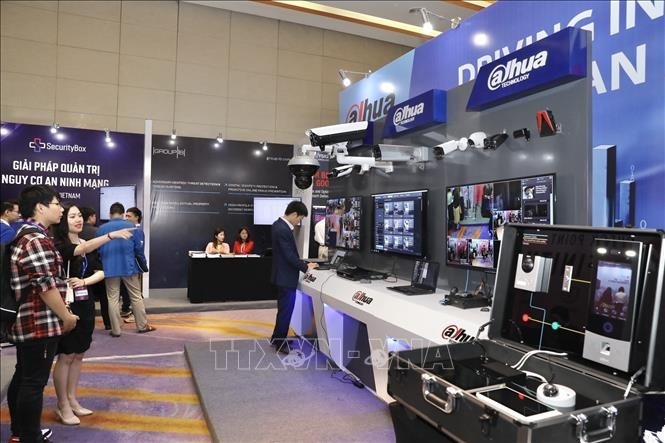On October 25, Hanoi will host the signing ceremony of the United Nations Convention against Cybercrime (Hanoi Convention), underscoring the country’s growing role and commitment to global efforts to combat online crime.
    |
 |
|
Visitors explore a technology exhibition on cybersecurity and safety equipment. |
Digital transformation, the digital economy, and digital society are creating vast opportunities but also exposing nations to mounting cyber risks, including data theft, high-tech fraud, and attacks on critical infrastructure. Cyberattacks not only inflict heavy financial losses but can also paralyse essential systems and threaten national sovereignty.
The United Nations estimates that cybercrime could cause global economic losses of 10.5 trillion USD in 2025—more than triple the 2015 figure. A World Economic Forum study found that cyberattacks on organisations worldwide surged by 58% over the past two years. In Vietnam, nearly half of public agencies and enterprises suffered at least one cyberattack in 2024, with the financial and banking sectors accounting for 71% of total incidents.
According to the Ministry of Public Security’s Department for Cybersecurity and High-Tech Crime Prevention (A05), Vietnam recorded over 1,500 online fraud cases in the first eight months of this year, resulting in losses totalling approximately 1.66 trillion VND (equivalent to 63 million USD). Criminals are increasingly exploiting deepfake technology, OTP hijacking, and impersonation of government agencies.
In the third quarter of 2025 alone, Vietnam reported over 6.5 million hacked personal accounts, nearly 4,000 phishing domains, and over 547,000 DDoS attacks—many powered by artificial intelligence, according to Viettel Cyber Security. Recent data breaches at the National Credit Information Centre and the airline customer service platform of Vietnam Airlines further underscored growing threats to privacy and consumer trust.
“Cybersecurity is no longer a potential threat—it is a constant risk to every country and every sector,” said Vu Ngoc Son, head of the Department of Research, Consulting, Technology Development and International Cooperation at the National Cybersecurity Association (NCA).
Repeated breaches, he warned, could erode public trust in online services and slow economic growth in the long run.
In response to the Hanoi Convention signing, the NCA has launched a series of nationwide campaigns to strengthen public awareness and resilience against online threats. These include the “Not Alone” campaign promoting the message “Together for Online Safety”, the “Fight Online Frauds 2025” campaign running from October to December, and the “All People Against Scams” media drive. The initiatives aim to enhance community awareness, rebuild digital trust, and create a collective “safety shield” against increasingly sophisticated cybercrime.
The NCA, in coordination with A05, also organised the 2025 Cybersecurity Student Competition under the theme “Data Security and Personal Data Protection”. The event reflects the strong engagement of Vietnamese youth with the Hanoi Convention, promoting the learning and practice of cybersecurity among students while identifying and nurturing young digital talent.
Other organisations have also joined efforts to raise awareness and boost cybersecurity capacity. Among them, the Vietnam National Cyber Security Technology Corporation (NCS) has launched a cybersecurity product ecosystem featuring advanced monitoring tools, AI-driven threat detection, and multi-layer protection systems tracking nearly 300 attack techniques, aiming to help agencies and enterprises build a solid, effective, and cost-saving security foundation while meeting the increasing requirements of the digital environment.
Source: VNA